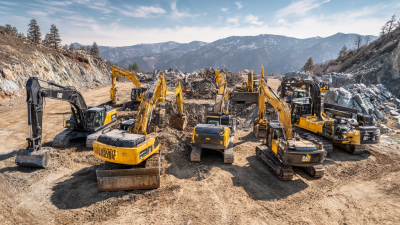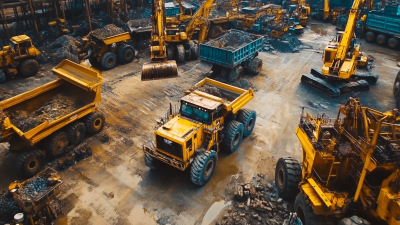Leave Your Message
- Phone
- E-mail
- Whatsapp
In 2023, becoming a top Heavy Equipment Operator is more crucial than ever, as the demand for skilled operators continues to rise across various industries, particularly in construction, mining, and logistics. According to the U.S. Bureau of Labor Statistics, the employment of heavy equipment operators is projected to grow by 6% from 2021 to 2031, highlighting the enduring need for qualified professionals in this field. As infrastructure projects surge and technological advancements reshape how operators handle equipment, the role of a Heavy Equipment Operator will not only require traditional operating skills but also a keen understanding of emerging technologies. This guide will provide you with essential strategies and solutions for excelling in this high-demand career, ensuring you not only meet industry standards but stand out in a competitive job market.

The heavy equipment operator field is experiencing a dynamic shift, with current statistics and trends reflecting a robust demand for skilled professionals. According to the Bureau of Labor Statistics, employment for heavy equipment operators is projected to grow by 5% from 2022 to 2032, adding approximately 24,000 jobs. This growth is largely driven by increased investments in infrastructure projects, which not only require more operators but also bring advanced machinery into play. As technology continues to evolve, operators are expected to adapt to new equipment, including automation and GPS-guided vehicles.
One key trend is the rising importance of safety training. A report by the National Center for Construction Education and Research (NCCER) highlighted that companies increasingly prioritize comprehensive safety programs, resulting in a significant reduction in workplace accidents. To stay competitive, aspiring operators should seek certifications and training opportunities that focus on safety protocols, as these credentials can make a candidate more appealing to employers.
Networking and continuous learning are crucial for career advancement in this industry. Joining professional organizations and attending workshops can provide valuable connections and insights into emerging technologies. As heavy equipment becomes more sophisticated, operators who invest time in learning about the latest advancements will position themselves as leading candidates in the job market.
| Category | Current Statistic | Trend | Projected Growth (2023) |
|---|---|---|---|
| Average Salary | $53,000 | Increasing demand for skilled operators | 5% increase |
| Job Openings | 120,000 | Expanding infrastructure projects | 10% increase |
| Training Programs | 300+ programs | Rise of certification importance | Stable growth |
| Operators in Industry | 1.5 million | Continuous demand for labor | 7% increase |
 In 2023, the heavy equipment operator field is evolving rapidly, requiring a diverse set of skills to keep up with technological advancements and industry demands. According to the Bureau of Labor Statistics, employment for heavy equipment operators is expected to grow by 10% from 2021 to 2031, indicating a robust demand for skilled professionals. To excel in this competitive landscape, operators must hone their technical abilities, including proficiency in operating advanced machinery equipped with GPS and automation systems.
In 2023, the heavy equipment operator field is evolving rapidly, requiring a diverse set of skills to keep up with technological advancements and industry demands. According to the Bureau of Labor Statistics, employment for heavy equipment operators is expected to grow by 10% from 2021 to 2031, indicating a robust demand for skilled professionals. To excel in this competitive landscape, operators must hone their technical abilities, including proficiency in operating advanced machinery equipped with GPS and automation systems.
Furthermore, strong problem-solving and critical thinking skills are essential. As heavy equipment operators often encounter unexpected challenges on job sites, the ability to analyze situations quickly and make informed decisions can significantly affect project timelines and safety standards. A report from the Associated General Contractors of America emphasizes the importance of these soft skills, noting that they are increasingly sought after by employers who prioritize safety and efficiency in their operations. Operators should also engage in continuous learning, keeping abreast of new technologies and industry regulations to remain relevant and effective in their roles.
In 2023, aspiring heavy equipment operators have numerous pathways to obtain the proper certification and training necessary for success in this vital field. As highlighted by industry reports, the global construction and mining equipment market is expected to experience a Compound Annual Growth Rate (CAGR) of 3.8%, emphasizing the increasing demand for skilled operators. This growth is fueled by ongoing projects across construction, mining, and waste management sectors, creating a pressing need for trained professionals.
When looking for the best training programs, it’s essential to choose those that provide comprehensive exposure to various heavy equipment models and operational techniques. Such programs not only teach the basics of equipment operation but also cover advanced safety protocols and efficiency practices. Tip: Enroll in programs that offer hands-on training with the latest technology to ensure that you are well-prepared for the practical demands of the job.
Furthermore, with labor shortages impacting the industry, many organizations are ramping up training initiatives to attract new talent. Collaboration between companies and educational institutions is key to developing cutting-edge training solutions. Tip: Seek out apprenticeships or on-the-job training opportunities as these can provide invaluable experience and enhance your employability in this competitive market.
The integration of advanced technology into heavy equipment operations has significantly reshaped the industry in recent years. According to a report by the Association of Equipment Manufacturers, approximately 75% of heavy machinery operators now use some form of technology to enhance productivity and safety on the job site. Innovations such as telematics, fleet management software, and automated machinery are not only streamlining operations but are also allowing operators to make data-driven decisions. This technological shift helps in efficient resource allocation and minimizes downtime, leading to noticeable cost savings.
Moreover, the rise of autonomous equipment is paving the way for transformative changes in heavy equipment operations. A study by McKinsey & Company predicts that automation could increase efficiency by up to 30% in specific applications. With the growing implementation of AI and machine learning, operators are better equipped to predict maintenance needs and prevent costly breakdowns. As a result, businesses that embrace these technologies are not just improving their operational capabilities, but are also attracting a new generation of skilled operators who are eager to work at the intersection of machinery and innovation.
The heavy equipment industry offers not only robust job opportunities but also impressive earning potential for skilled operators. According to the Bureau of Labor Statistics, the median annual wage for heavy equipment operators was approximately $48,000 in 2022, with top earners making over $75,000. As the construction industry continues to expand, driven by infrastructure investments and urban development, the demand for qualified operators is expected to grow by 10% through 2031. This growth creates numerous career advancement opportunities, allowing operators to specialize in various types of machinery or take on supervisory roles.
In addition to traditional heavy equipment operations, emerging technologies are shaping new pathways for career growth. Operators who acquire skills in operating advanced machinery equipped with automation and GPS technology may see their earning potential increase significantly. A report from the Association of Equipment Manufacturers highlights that operators proficient in these technologies can earn upwards of $60,000 annually. Investing in ongoing training and certification not only enhances job security but also positions operators to take advantage of higher-paying roles within the industry as it evolves.







